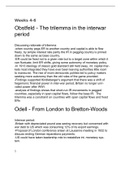Summary
Summary POLI 445 Reading Notes weeks 4-6
- Course
- POLI 445 (POLI445)
- Institution
- McGill University (Mcgillu)
Notes on the readings from weeks 4-6 of course POLI 445 at McGill University. Notes taken from a student with a final grade of A in 445.
[Show more]



